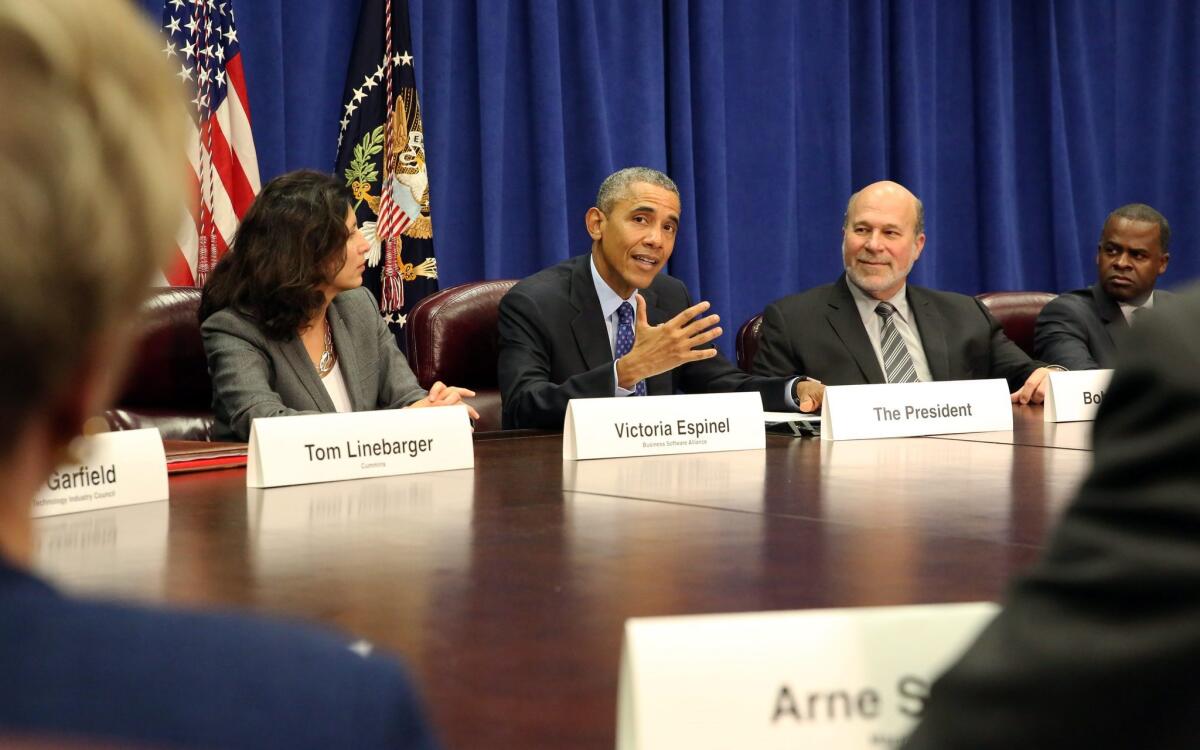The great Trans-Pacific Partnership debate

President Barack Obama meets with agriculture and business leaders to discuss the Trans-Pacific Partnership at the Department of Agriculture in Washington on Oct. 6.
- Share via
The White House released the text of its new trade deal, the Trans-Pacific Partnership, last week, and like any good citizen, I tried my best to read it. But the 12-country agreement is more than 2,700 pages long, plus annexes, and a lot of it sounds like this: “The parties shall at all times endeavor to agree on the interpretation and application of this agreement, and shall make every attempt through cooperation and consultations to arrive at a mutually satisfactory resolution.”
And that’s one of the lucid bits. Those members of Congress who say they’ve read the whole thing? They’re fibbing.
There are three ways a befuddled citizen can figure out what to think about a complex deal like the TPP.
The first is tribal: Listen for signals from the politicians you support and assume they’ve made the right decisions. But that’s not so easy when it comes to the TPP because the agreement divides both parties.
It’s no surprise that President Obama is strongly in favor of a deal he and his aides just finished negotiating. “It’s an agreement that puts American workers first and will help middle-class families get ahead,” he said. “It includes the strongest commitments on labor and the environment of any trade agreement in history.” The Democratic presidential candidates don’t agree. Bernie Sanders says the TPP is “even worse” than he expected. Hillary Rodham Clinton opposes it too, and hopes you’ll forget that she once called it “the gold standard” of trade deals.
Among Republicans, “establishment” candidates Jeb Bush and John Kasich support the agreement, as do Ben Carson and Marco Rubio. But Donald Trump and Ted Cruz have said they are opposed.
A second approach is to listen to what interested parties say and choose sides based on where your sympathies lie.
Manufacturing workers and their unions think another free-trade deal will inevitably hurt them. The last half-century of globalization has coincided with a massive loss of blue-collar jobs; not all of the erosion was due to trade, but to labor, the TPP looks like more of the same. “A bad deal for American workers,” AFL-CIO President Richard Trumka said.
Environmentalists are condemning the deal too, mostly because it doesn’t crack down on climate change. But this is, after all, a trade deal; talks on global warming are already underway.
Big business is mostly in favor of the deal, although not universally so. Tobacco companies are unhappy that it deprives them of the right to sue countries that restrict trade by limiting cigarette sales. Pharmaceutical companies complain that they aren’t getting enough protection for their patents. (Doctors Without Borders thinks they are getting too much.)
Those members of Congress who say they’ve read the whole thing? They’re fibbing.
Now for the final, labor-intensive approach: Listen to smart people who don’t have a vested interest but are trying to analyze the deal in a comprehensive way.
For a start, I consulted with Joseph A. Massey, a former U.S. trade negotiator with China and Japan who has served as an advisor to Republicans and Democrats.
Massey made three points.
First, he said, the TPP’s impact has probably been oversold. “It has benefits for U.S. export industries, but I think they’re modest,” he said. “It’s clearly good for the entertainment and tech sectors. But it’s not revolutionary.”
Second, he said, the biggest threat to jobs in the United States isn’t free-trade agreements; it’s domestic policy. “We’ve neglected our own manufacturing sector,” he said. “Germany is a party to trade agreements too, but they’ve done a much better job at maintaining a skilled blue-collar workforce. We need more incentives for companies to invest here, employ American workers and invest in their training.”
Third, he noted, the TPP isn’t only about trade. It’s also about economic reform, higher labor standards and environmental protection in developing countries such as Vietnam and Malaysia. And it’s a way to knit countries on the Pacific Rim into a trading system that the United States helped design instead of one run by Asia’s growing power, China.
Obama hasn’t been subtle about pushing that geopolitical argument. “If we don’t pass this agreement — if America doesn’t write those rules — then countries like China will,” he said last week.
To foreign policy strategists, that’s a compelling pitch. To American workers, it’s not.
So are we better off with or without the TPP? If Congress ratifies it, that won’t turbocharge the U.S. economy. If Congress blocks the deal, that won’t stop globalization. And like any trade agreement, it creates winners and losers.
One political lesson is clear: The bipartisan consensus that enabled Bill Clinton and George W. Bush to pass trade agreements has broken down, mostly because, to many Americans, their costs have been clearer than their benefits.
To win Congress’ approval of the deal — an important part of Obama’s second-term agenda and his legacy — the president still has a lot of persuading to do.
Twitter: @doylemcmanus
Follow the Opinion section on Twitter @latimesopinion and Facebook
More to Read
A cure for the common opinion
Get thought-provoking perspectives with our weekly newsletter.
You may occasionally receive promotional content from the Los Angeles Times.







